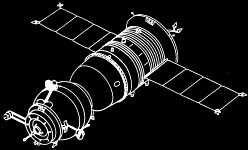
|
PAYING
FOR A RIDE
|
The
Soviet manned spaceflight program entered a new era in 1986 when
Mir, a more advanced modular space station, was launched. To justify
the expense of the space program in a more frugal political and
economic climate, the Soviets could no longer give foreign cosmonauts
free trips into space for good will. Instead, the Soviet government
began offering room aboard the Soyuz TM spacecraft and Mir space
station for a fee, payable in hard currency. In
1990 a Japanese journalist became the first paying passenger in
space. The round-trip ticket to the Mir space station cost the equivalent
of $12 million.
|
SOYUZ
TM-10 SPACECRAFT
In
this landing module, cosmonauts Gennadi Manakov and  Gennadi Strekalov returned to Earth in December 1990 after
a four-month stay on space station Mir. With them was Japanese journalist
Toyohiro Akiyama, who had arrived with the new Mir crew on Soyuz
TM-11. Gennadi Strekalov returned to Earth in December 1990 after
a four-month stay on space station Mir. With them was Japanese journalist
Toyohiro Akiyama, who had arrived with the new Mir crew on Soyuz
TM-11.
The
spacecraft is heavily charred from the heat of reentry. Returning
cosmonauts customarily autograph their spacecraft after a successful
recovery. Their chalk signatures and thank-you's are still visible.
Interior control panels and the cosmonauts' seats can be seen through
the portholes.
Lent by
The Perot Foundation
|
|
|
|
| Length: |
2.2 m (7 ft 2
in) |
| Diameter: |
2.2 m (7 ft 2
in) |
| Weight: |
2,800 kg (6,200
lb) |
| Manufacturer: |
Energia Scientific
Production Assn. |
| Launch vehicle: |
Soyuz |
|
|
|
|
A SOYUZ
SORROW
A
poignant reminder of the risks of spaceflight, this doll was autographed
by cosmonaut Viktor Patsayev just before the ill-fated Soyuz 11
flight in 1971. After three successful weeks aboard the Salyut 1
space station, Patsayev and his comrades Georgi Dobrovolsky and
Vladislav Volkov died during descent when their capsule accidentally
depressurized; to fit into the small spacecraft, the three-man crew
had to forego wearing space suits. Patsayev had post-dated his signature
to the day after his planned return.
Lent by
Emmet, Toni, and Tessa Stephenson
|
|